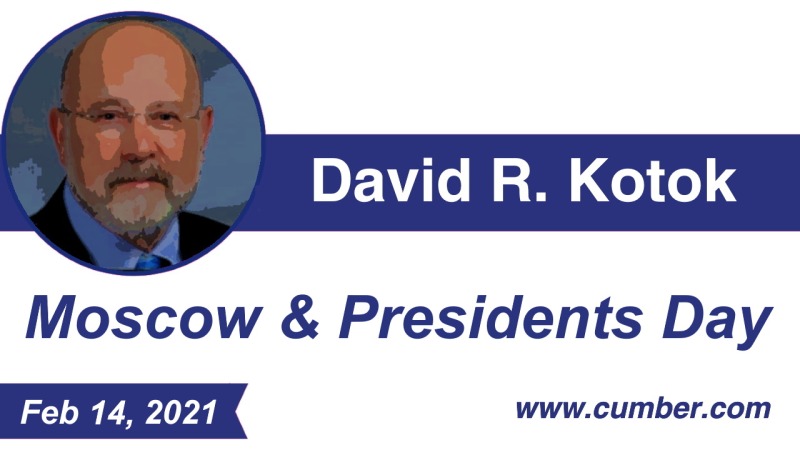America’s January 6th nightmare was replayed for all to see again; previously unknown security video has been added. The Constitutionally prescribed Senate process and the outcome are determined by our system. And now the national policy debate of who we are and how we do these things is again joined. Tune in CNN, Fox, MSNBC, Newsmax and get 4 opinions with 150 people delivering them.

We’ve written enough about the impeachment (whether #1 or #2). And we’ve invoked respect from those of us who are military veterans’ and hold strong views about the Jan. 6 insurrection. And, of course, we’ve already discussed how the stock market views this impeachment as just a political event. Stocks set new all-time highs this week.
Mike S. asked me how I thought the Jan. 6 witnessed behavior would be treated in Moscow. By “Moscow,” Mike meant not just Russia but all types of dictatorships. Mike was pointing to the fact that, in America, the perpetrators of the defilement of our nation’s Capitol still have those protective freedoms – benefits enshrined in the extraordinary historical experiment that is the US Constitution.
The First Amendment was debated in the Senate. That amendment uses 45 words to establish five freedoms: of religion, speech, press, peaceful assembly, and the right to petition government to redress grievances. Forty-five words. Five precious freedoms.
So Mike is asking what happens in a country where some or all of those five freedoms aren’t embedded in the nation’s psyche and its laws.
We have an example with which to answer Mike.
That example is Joseph Stalin, a key figure in Russian history.
The famous composer Dmitri Shostakovich (https://en.wikipedia.org/wiki/Dmitri_Shostakovich) worked under the conditions of Stalin’s rule. He watched the suppression of religion around him; he had no right to free speech; there was no free press; any assembly not approved and encouraged by Stalin’s regime was persecuted, and not gently; and, no one could petition the government for a grievance unless Stalin approved.
Shostakovich composed brilliant music under these repressive conditions. He had to contend with a musical board of review. He had to consider that Stalin’s political allies were watching his every move and examining his every note. He was twice denounced by the government and forced to kowtow to it. All he had was music.
We recommend Symphony No. 5 in D Minor, Op. 47, for those who seek to understand the angst Shostakovich experienced in a nation where there were no freedoms guaranteed under law. No. 5 is all about the profound recognition that he reached: The only means he had to express himself was the music he was creating. And so the only way for us to experience what he felt is to immerse ourselves in that music. Notice the way soft messages come from the various sections of the orchestra. Then notice the harsh and forceful suppression. Even the finale is tortured. If offers a mix of hope and the reality that suppression is winning. Here’s Symphony No. 5: https://www.youtube.com/watch?v=cJb-US3RU_U.
Symphony No. 7 in C Major, Op. 60 (“The Leningrad”) is the work most expressive of Shostakovich’s pain. Having achieved his musical statement in Number 5, the composer now reveals the anguish of the conclusion that Stalin has prevailed. There is no joy. There is no sparkle. There is no happy ending. When I hear No. 7, I ache for the losses that were so gently expressed in No. 5. In No. 5, there was still a weak glimmer of hope; in No. 7, hope is dead. No. 7 is a musically brilliant funeral dirge: https://www.youtube.com/watch?v=j0eAfA6cSoU.
Yes, Mike, there are examples that show us what it would be like if the behavior we saw in our nation’s capitol occurred in Moscow. Stalin’s repressive regime and the Great Purge remind us of the stark possibilities: https://en.wikipedia.org/wiki/Joseph_Stalin. The music of Dmitri Shostakovich sweeps us into that world devoid of freedoms.
On this President’s Day weekend, we remember our task which is to ensure that we never empower a Stalin in Washington, DC and that we continue to protect all of our rights.
If we succeed, our grand 220-year experiment will continue. If we fail, all we will have left is Shostakovich’s Symphony Number 7.
David R. Kotok
Chairman of the Board & Chief Investment Officer
Email | Bio
Links to other websites or electronic media controlled or offered by Third-Parties (non-affiliates of Cumberland Advisors) are provided only as a reference and courtesy to our users. Cumberland Advisors has no control over such websites, does not recommend or endorse any opinions, ideas, products, information, or content of such sites, and makes no warranties as to the accuracy, completeness, reliability or suitability of their content. Cumberland Advisors hereby disclaims liability for any information, materials, products or services posted or offered at any of the Third-Party websites. The Third-Party may have a privacy and/or security policy different from that of Cumberland Advisors. Therefore, please refer to the specific privacy and security policies of the Third-Party when accessing their websites.
Sign up for our FREE Cumberland Market Commentaries
Cumberland Advisors Market Commentaries offer insights and analysis on upcoming, important economic issues that potentially impact global financial markets. Our team shares their thinking on global economic developments, market news and other factors that often influence investment opportunities and strategies.

